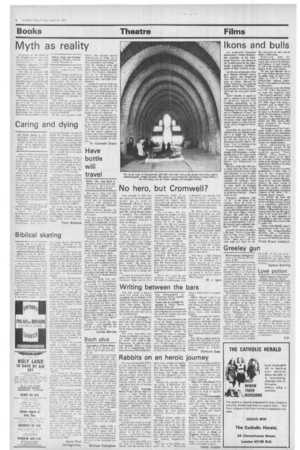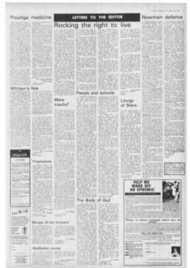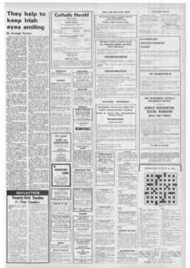Page 6, 24th August 1973
Page 6

Report an error
Noticed an error on this page?If you've noticed an error in this article please click here to report it.
Tags
Share
Related articles
Apostolate For All Every Day
Hall Caine's Life Of Christ Is Destructive Of The Whole...
`violence Is Incompatible With God's Nature'
"mission To Moscow
Is There A "chosen Race"?
Myth as reality
Hebrew Myth and Christian Gospel by Thomas Fawcett (C.S.M. Press £3.75) To project on the minds of the Scripture-writers our own scientifically derived metaphysics is to use categories unknown to them — indeed, antithetical to their convictions and beliefs.
That they, in common with individuals of all races and cultures, were conditioned by their particular mode of apprehending the world through symbols and archetypes, in other words mythologically, is undeniable, but so is their ex'perience of the reality of the spiritual and their attempts to state it in appropriate language. There is more to ourselves and to the world than meets the eye. It is this "more" which is the subject-matter of myth: not myth in the sense of gods and goddesses or of natural forces personified, but myth Strictly defined and disciplined to terms expressive of our deepest human experience and aspirations.
Science attempts an objective description of the world; myth asserts a reality beyond the observable. Neither can describe the world precisely as it is, but both reveal what is understood to be true. The one will observe a flag flying over a Georgian building, the other will recognise the presence of the monarch.
The Hebrews mythicised their history; so did the early Christians the life of Jesus, and this to reveal the transcendental element and meaning of God's action on mankind.
By their own accounts of the
Christ, the Gospel writers endeavoured to make up to those who had not seen for what they themselves had beheld both the empirical facts and their own experience of the divine reality inherent to those facts. The Gospels, therefore, are to he recognised as historical and the mythological spectrum their indivisible complement.
Thomas Fawcett develops the above thesis with the care and acumen of a geneticist in his splendid and enlightening book. The nature of myth and its function are closely examined on a world-wide scale and his own position made conclusively clear, The perennial symbols of light, sea and serpent are thoroughly explored in the context of the Gospels, as is paradise lost and regained.
The result is an immense increase in our understanding of the breadth and depths of the New Testament and its appeal to the mystery of man's mind. This is seen to apply especially to those Jews who, even more than the author appears to suspect, saw Jesus of Nazareth, its realisation, emblazoned with the immortal heraldry of their race.
Fr. Kenneth Green
blog comments powered by Disqus









